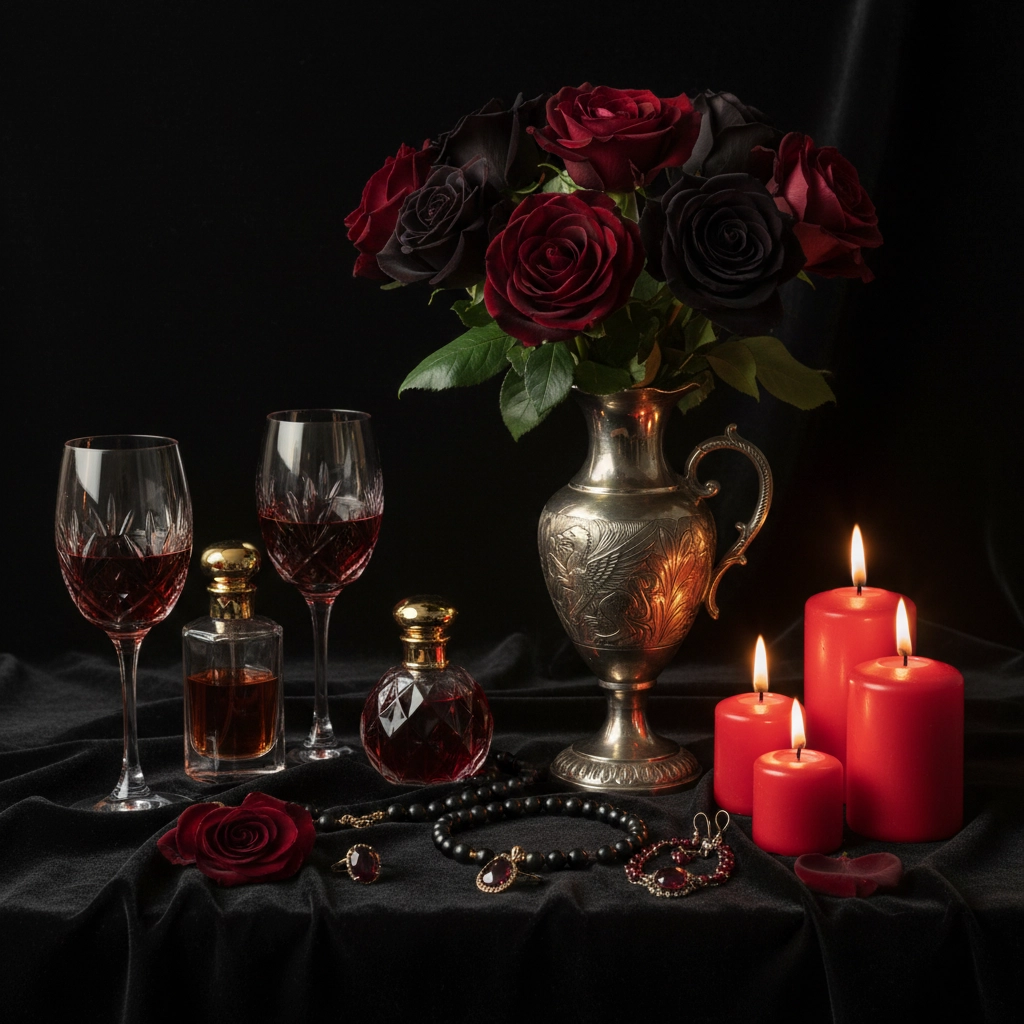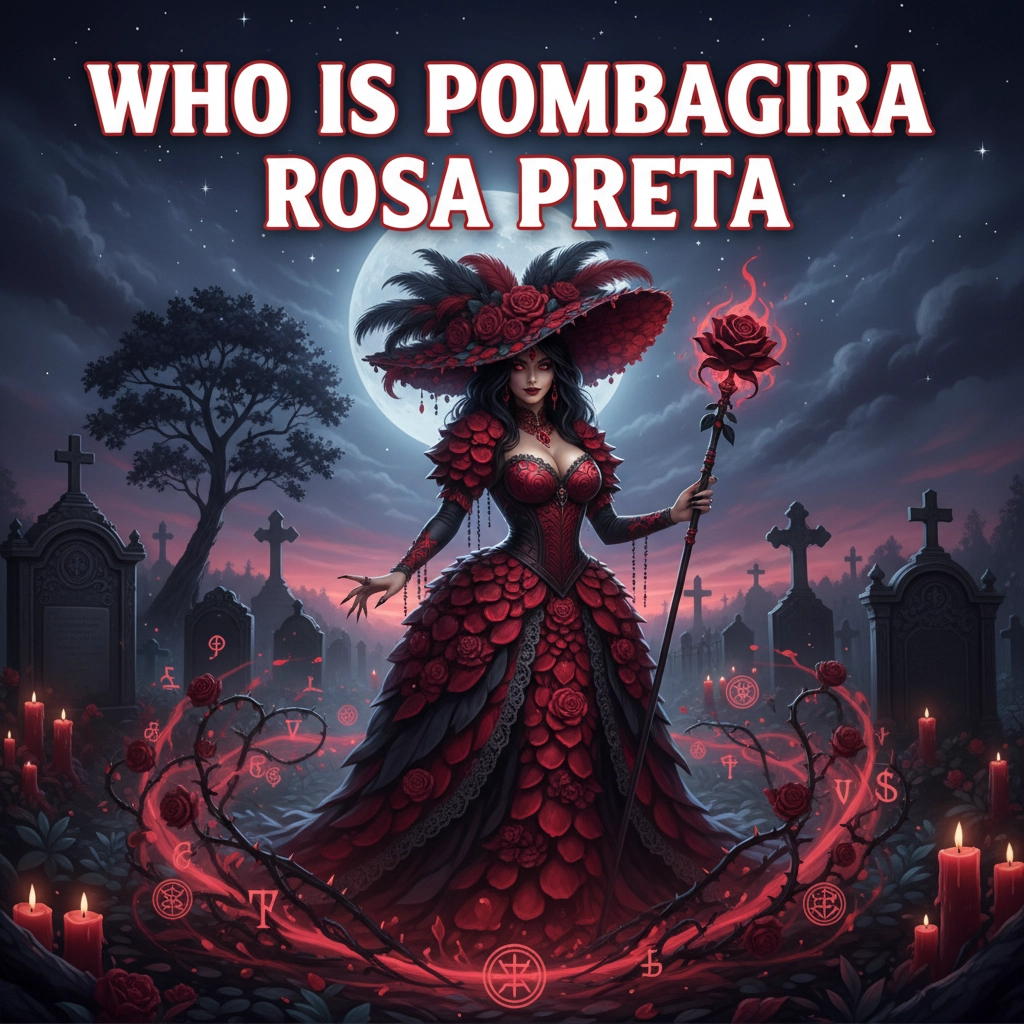Have you ever felt drawn to a spiritual name that seems to whisper secrets from the crossroads between worlds? Pombagira Rosa Preta represents one of those enigmatic figures that dance at the edges of documented tradition, where mystery meets the profound depths of Afro-Brazilian spirituality.
The Shadow Rose: A Spirit Shrouded in Mystery
Unlike her more widely documented sisters in the Pombagira pantheon, Rosa Preta exists in the liminal spaces of spiritual practice: spoken of in hushed tones among practitioners but rarely detailed in formal texts. This isn't unusual in traditions where knowledge passes from mouth to ear, heart to heart, rather than through written records.
What we do know is that she belongs to the powerful lineage of Pombagira spirits: those fierce feminine entities who serve as messengers, protectors, and agents of transformation in Umbanda and Quimbanda traditions. The very name "Rosa Preta" suggests a being who embodies both beauty and darkness, delicacy and strength.

Understanding the Pombagira Tradition
To grasp who Rosa Preta might be, we must first understand the broader context of Pombagira spirits. These are not demons or evil entities, despite colonial misrepresentations. Instead, they represent the divine feminine in its most uncompromising form: sexuality, power, independence, and the courage to challenge societal norms.
Pombagira spirits emerged from the crossroads of cultures: African traditions meeting indigenous Brazilian beliefs and syncretizing with elements that survived the brutal passage of slavery. They represent resistance, survival, and the refusal to be diminished by oppression.
The name itself derives from the Kimbundu language, meaning "crossroads": those sacred spaces where worlds meet and transformation becomes possible. Every Pombagira embodies this liminal power, serving as bridges between the material and spiritual realms.
The Rose Variants: Beauty with Thorns
Within the Pombagira tradition, we find several "Rosa" (Rose) variants, each representing different aspects of feminine power and beauty. Pombagira Rosa Negra (Black Rose) works with matters of love, relationships, and sexual healing, particularly addressing negative patterns and toxic connections. Pombagira Rosa Caveira (Skull Rose) combines beauty with death's wisdom, teaching about endings that lead to new beginnings.
Rosa Preta, if we follow this pattern, might represent the hidden aspects of beauty: the strength found in darkness, the roses that bloom in shadow, the feminine power that thrives despite being overlooked or misunderstood.

What "Preta" Represents in Spiritual Context
The term "Preta" in Brazilian Portuguese carries complex layers of meaning, often referring to blackness or darkness. In spiritual contexts, this isn't about evil or negativity: it's about the fertile darkness of the womb, the rich soil where seeds germinate, the mysterious depths where transformation occurs.
A Pombagira associated with "Preta" energy might work with:
- Hidden knowledge and secret wisdom
- Protection for those marginalized by society
- Healing from deep, ancestral wounds
- Transformation through shadow work
- Justice for those whose voices have been silenced
The Consort of Exu: Understanding the Partnership
Every Pombagira works in partnership with Exu, the masculine messenger spirit who opens paths and removes obstacles. While Exu represents the dynamic, penetrating force that creates change, Pombagira embodies the receptive yet fierce feminine power that shapes and directs that change.
Rosa Preta would likely work with specific Exu entities who share her affinity for hidden knowledge and protective darkness. This partnership creates a balanced spiritual force capable of both creating opportunities and protecting vulnerable individuals.

Offerings and Reverence: How She Might Be Honored
Based on patterns within the Pombagira tradition, Rosa Preta would likely appreciate offerings that acknowledge both beauty and depth:
Traditional offerings might include:
- Dark red or black roses
- Red wine or champagne
- Perfumes and cosmetics
- Jewelry, particularly with dark stones
- Cigars or cigarettes (common for all Pombagira spirits)
- Red or black candles
The key is approaching with respect, understanding that these spirits demand genuine reverence rather than casual curiosity. They respond to sincere petitioners who come with clear intentions and proper protocol.
Modern Relevance: Why These Spirits Matter Today
In our contemporary world, where feminine power is still often suppressed or misunderstood, Pombagira spirits like Rosa Preta offer crucial medicine. They provide spiritual support for those who refuse to be diminished, who insist on their right to exist fully and authentically.
Rosa Preta might particularly resonate with:
- Individuals reclaiming their personal power
- Those healing from sexual trauma or shame
- People fighting against systemic oppression
- Anyone seeking to embrace their shadow aspects for wholeness
- Those working to transform generational patterns
The Crossroads of Tradition and Mystery
What makes figures like Pombagira Rosa Preta so compelling is precisely their existence at the crossroads between documented tradition and lived experience. Not every spirit needs academic validation to be real and powerful in practitioners' lives.
This mystery doesn't diminish her potential significance: if anything, it amplifies it. In traditions where oral transmission remains sacred, some knowledge stays deliberately veiled, revealed only to those ready to receive it through direct spiritual experience rather than scholarly research.

Approaching the Unknown with Respect
If you feel drawn to Rosa Preta, approach with the reverence due to any powerful spiritual entity. Begin by learning about Pombagira traditions in general, developing relationships with more documented spirits, and finding authentic practitioners who can guide your understanding.
Essential steps include:
- Studying Afro-Brazilian traditions respectfully
- Understanding the historical context of these practices
- Connecting with authentic teachers and communities
- Beginning with proper spiritual cleansing and protection
- Approaching with genuine spiritual intent rather than curiosity
The Power of Unnamed Mysteries
Perhaps Rosa Preta's greatest teaching is that not everything needs to be fully explained or documented to be profoundly real. In our age of instant information, some wisdom still travels the ancient paths: from teacher to student, through dreams and visions, in the sacred silence between heartbeats.
She reminds us that true spiritual power often exists in:
- The spaces between what we know and what we sense
- The wisdom that comes through experience rather than books
- The courage to work with mystery rather than demanding certainty
- The understanding that some knowledge must be earned, not simply learned
Embracing the Shadow Rose
Whether Rosa Preta exists as a distinct spirit entity or represents an archetype within the Pombagira tradition, her energy speaks to something essential in our human experience: the need to honor the hidden aspects of feminine power, to find strength in what others might dismiss as darkness, and to bloom beautifully despite challenging circumstances.
Like roses that somehow find ways to bloom in unexpected places, those who work with Rosa Preta energy might discover reserves of strength they never knew they possessed. They might learn to transform pain into wisdom, isolation into independence, and society's rejection into authentic self-acceptance.
The crossroads remain open, and the spirits continue their ancient work of transformation. Whether Rosa Preta emerges more clearly in documented tradition or remains a whispered mystery, her essence serves as a reminder that feminine power takes many forms: some celebrated, some hidden, all equally sacred in their own right.
In the end, the most important question isn't whether we can find Rosa Preta in books and websites, but whether we can find her reflection in our own journey toward wholeness and authentic power.



